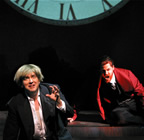Music Teacher 'Rakes' in Good Notices in Operatic
Role
Assistant professor of music Gerald Seminatore
debuts as Rakewell in Igor Stravinsky’s work
October 3, 2006
By Gail Matsunaga
As Tom Rakewell in West Bay Opera’s summer production of “The
Rake’s Progress,” Gerald Seminatore — assistant professor
of music — comes into a large inheritance, abandons his true love
for the bright lights of London and embarks on a life of debauchery. By
the time he realizes the error of his ways, it’s too late: he’s
made a pact with the devil.
It was Seminatore’s debut as Rakewell in Igor Stravinsky’s work and
with the West Bay Opera. In its review, the San Francisco Classical Voice said
that the tenor’s “bright voice, always on pitch and secure, flowed
with grace through the long, complicated phrases Stravinsky wrote.”
“The experience was really quite fine,” said Seminatore, who has
taught on campus since 2003. “We had a nationally known director, a dynamic
conductor from San Francisco and a nice team of people to work with — a
strong cast and production team.”
Tom Rakewell is the latest of about 30 different roles Seminatore has performed
in productions here and abroad. Concert engagements have included performances
with the Chautauqua and San Antonio symphonies, Tulsa Philharmonic, Cincinnati
Philharmonic and Cypress Masterworks Chorale.
Balancing professional dates with teaching can mean “a situation where
you have to move schedules around,” he explains. “For ‘The
Rake’s Progress’ for example, I had a grad student teach a couple
of student-applied lessons. Once a week, I had to fly back and forth to San Jose
during rehearsals. The upside is that I can later share these experiences with
the students.”
When asked when he knows when he’s ready to take on a new role, he said, “You
kind of have an internal compass that points you in the right direction. I knew
I was ready for Tom. It was a perfect fit for me.”
Seminatore’s summer also included traveling to Germany for a performance
of operetta solos and duets in Kassel, as well as a teaching a class at Kreismusikschule,
a post-secondary school in Löbau.
German students “all could sing very clearly in English, whereas ours
can’t when singing in German,” says Seminatore about teaching in
Germany. “And, musically, they’re a little more advanced early on
in their training than ours might be.”
On the flip side, Seminatore adds, “Some of the German students are not
quite as proactive as our students. They’re more deferential to teachers.
There are two different sorts of school cultures that are fascinating to compare.”


 Produced by the Office of Public Affairs at California State University, Fullerton.
Produced by the Office of Public Affairs at California State University, Fullerton.